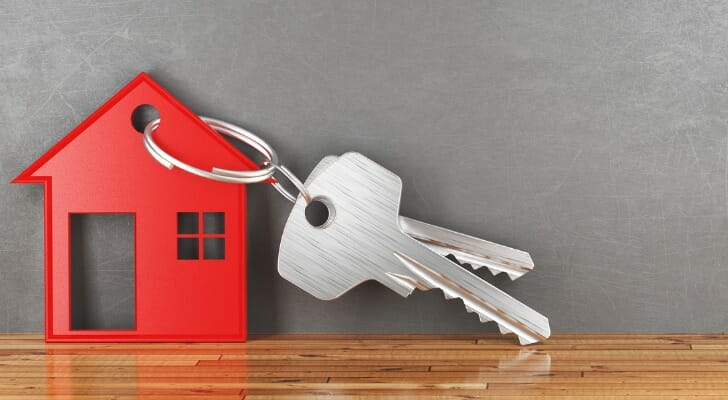
With just plenty of historic charm and seaside beauty, Delaware cracks SmartAsset’s top 10 states for the middle class. If you’re hoping to buy a home there, be sure to check out the various homebuyer programs offered by both the federal government and the state of Delaware. These include programs that provide down payment assistance and tax credits available to Delaware residents. As you set off on your homebuying journey, consider working with a financial advisor who can guide you through some of the largest financial decisions you can make.
Federal First-Time Homebuyer Programs
Before we explain the programs available exclusively to Delaware residents, we’ll first go over several national programs that residents of any state can apply for. Be sure to consider programs on both a federal and state level when conducting your mortgage search.
FHA Loans
| Pros | – Low down payment – Flexible credit approval |
| Cons | – Larger down payment is needed for those with a credit score lower than 580 |
| Eligibility | – Credit score of at least 500 – Must have 3.5% down payment – Debt-to-income ratio of <43% |
| Best For | – Any borrower that lacks sufficient funds for a down payment |
The Federal Housing Administration backs FHA loans, which are great for potential homebuyers who don’t have enough money for a standard 20% down payment. FHA loans only require you to put 3.5% of your home’s value down.
To receive this perk in its full glory, you must have a credit score of at least 580. If your credit score is between 500 and 580, you’ll need to make a down payment closer to 10%. Even with the credit score requirement, qualifying for an FHA loan is relatively easy.
VA Loans
| Pros | – Up to 100% loan coverage – No private mortgage insurance requirement – Lower closing costs |
| Cons | – Must pay a VA funding fee – Application process can be drawn out |
| Eligibility | – Must be a current or former military member, spouse, or another beneficiary – Credit score of at least 620 |
| Best For | – Veterans without little monthly income and a small amount of savings |
The Department of Veterans Affairs insures VA loans, which help veterans that can’t afford a typical 20% down payment. In fact, VA loans allow you to buy a home with no down payment at all. In most cases, veterans need a credit score of 620 or higher to qualify. You also need to pay a VA funding fee, which ranges anywhere from 1.25% to 2.4% of your home’s value depending on whether or not you choose to pay a down payment.
To cut costs even further, the VA usually offers lower closing costs than a homebuyer would find with a conventional or another mortgage. You also won’t need to pay for private mortgage insurance (PMI).
USDA Loans
| Pros | – No down payment – Flexible credit approval |
| Cons | – Not available if you qualify for a conventional mortgage |
| Eligibility | – Household income must be within 115% of the median income in the area for most USDA loans – Home must be in an eligible area |
| Best For | – Low- to mid-income borrowers willing to live in rural or semi-rural areas |
Legally known as a “Section 502 Single Family Housing Guaranteed Loan Program,” USDA mortgages are backed by the United States Department of Agriculture (USDA). They were created to attract new homebuyers to less populous areas in the country. To qualify, you must earn less than 115% of the U.S. median income.
Most borrowers won’t have to pay any sort of down payment to secure a USDA loan. If your credit score falls a bit lower on the FICO® scale, you may have to pay a down payment of roughly 10%. Keep in mind that if you can qualify for a conventional mortgage, you can’t get a USDA loan.
Good Neighbor Next Door Program
| Pros | – 50% flat reduction in home cost |
| Cons | – Only available in select areas – Only available to certain professionals |
| Eligibility | – Must be a police officer, firefighter, emergency medical technician or pre-k through 12th-grade teacher – Must agree to remain in the home for at least three years |
| Best For | – Public servants with limited savings |
The Good Neighbor Next Door Program is only available for emergency personnel and pre-K through 12th-grade teachers. More of a discount than a loan, it offers a flat 50% reduction on the home’s sticker price. Participants are encouraged to get a conventional, VA or FHA mortgage to pay for the home, but they can also pay cash.
In order to qualify, your home must be located within what the Department of Housing and Urban Development (HUD) determines a “revitalization area.” You must also agree to make the home your primary residence for at least three years.
Fannie Mae/Freddie Mac
| Pros | – Low down payment – Various loan styles available – No credit is required for certain loans |
| Cons | – Higher interest rates than other federal programs |
| Eligibility | – Must earn within location-specific income requirements |
| Best For | – Any borrower that doesn’t qualify for other federal programs, but needs a discount on the upfront costs of homeownership |
Over the years, the federal government created its own mortgage lenders known as Freddie Mac and Fannie Mae. While technically two different entities, they offer very similar programs for first-time homebuyers.
Freddie Mac provides Home Possible® mortgages that are 97% LTV, meaning you have a down payment of 3%. The Home Possible® loan comes in 15- to 30-year fixed-rate and 5/5, 5/1, 7/1 and 10/1 adjustable-rate terms. You also will not need any credit history for this loan.
The HomeReady® loan from Fannie Mae also requires down payments as low as 3%. Borrowers need a credit score of 620 or above to qualify, though. You must also earn an income at or near the U.S. median. With both Home Possible® and HomeReady® loans, you must get private mortgage insurance by the time of purchase, though you can cancel it once you’ve accrued 20% equity in your new home. Since it’s a relatively high expense, this is a serious benefit.
NADL
| Pros | – No down payment – Flexible credit approval – No private mortgage insurance requirement – Lower closing costs |
| Cons | – Only available in select areas |
| Eligibility | – Must be a current or former military member of Native American descent, their spouse or another beneficiary – Home must be located in an eligible area |
| Best For | – Native American veterans with limited savings |
A Native American Direct Loan (NADL) is another mortgage program backed by the Department of Veteran Affairs. You’ll need to be a Native American military veteran (or spouse/beneficiary thereof) to qualify. It comes with impressive perks, like 0% down payment and a set interest rate. The interest rate is currently 4.5%, though that is subject to change based on market and Prime Rate fluctuations.
You won’t even need an impressive credit record to qualify. You also won’t need to get private mortgage insurance, a benefit that extends from normal VA loans. Plus, closing costs also tend to be lower with NADLs. Your home must be located on allotted lands, Alaska Native corporations, Pacific Island territories or federally-recognized trusts to qualify, though.
Delaware First-Time Homebuyer Programs

While the federal programs might be what you are looking for, they aren’t the only programs designed to help you buy your home. The following programs are for residents of the State of Delaware.
DSHA Homeownership Loan
| Pros | – Lower interest rates – Potential to combine with down payment assistance and tax credit to save even more |
| Cons | – Certain borrowers must complete housing counseling |
| Eligibility | – Credit score of at least 620 – Must earn less than $97,900 – Home must cost less than $417,000 |
| Best For | – Any borrower with limited income and a decent credit score |
The Delaware State Housing Authority (DSHA) works with participating lenders to provide 30-year fixed-rate mortgages. The largest benefit of these loans is below-market interest rates, which can be combined with the perks of FHA, VA, USDA and conventional loans.
To qualify, you must earn within certain income requirements and your maximum loan value cannot exceed $417,000. Although anyone with a credit score as low as 620 can apply, borrowers with a credit score below 660 must participate in housing counseling with HUD-approved educators.
Neighborhood Stabilization Program
| Pros | – Reduction in home cost – Flexible credit approval – Potential to combine with down payment assistance and tax credit to save even more |
| Cons | – Only available in select areas |
| Eligibility | – Must earn within 120% of the area median income (AMI) – Must complete HUD-certified housing counseling |
| Best For | – Low- to mid-income borrowers willing to move to areas affected by foreclosures |
HUD started the Neighborhood Stabilization Program (NSP) to assist communities that have been or are likely to be affected by foreclosures. For Delaware homebuyers, that means affordable homeownership opportunities.
To qualify, borrowers must earn at or below 120% of the area median income (AMI) and agree to participate in homebuyer education classes. These counseling sessions ensure that you understand the risks, responsibilities and rewards associated with mortgages and homeownership.
DSHA Preferred Plus
| Pros | – No-interest loan up to 5% of your mortgage amount – Potential to combine with DSHA loan and tax credit to save even more |
| Cons | – Certain borrowers must complete housing counseling |
| Eligibility | – Credit score of at least 620 – Must earn less than $97,900 – Home must cost less than $417,000 |
| Best For | – Homebuyers taking advantage of DSHA programs who need more help to cover their down payment or closing costs |
If saving enough for a down payment or closing costs is holding you back from homeownership in Delaware, the DSHA Preferred Plus program can help. It provides a second, no-interest loan between 2% to 5% of your overall loan amount to use toward the upfront costs of homeownership.
You must have a DSHA loan to qualify, so the eligibility requirements are largely the same. As with any DSHA loan, you must complete housing counseling if your credit score is lower than 660. Keep in mind that you must repay the loan when you sell your home, refinance your mortgage or get a new primary residence.
In addition to upfront savings, the Preferred Plus program is intended to help borrowers have the necessary funds to fill and improve their new homes and pad their savings accounts for the future. Even though you must pay the funds back, these are very flexible loans. Since they don’t carry any interest, you’ll never pay back more than you received.
Delaware First-Time Home Buyer Tax Credit
| Pros | – Reduced federal tax bill – Lasts the entire lifetime of the loan until repayment, refinancing or sale – Potential to combine with DSHA loan and down payment assistance to save even more |
| Cons | – Must pay application fees |
| Eligibility | – Income and purchase price limits dependent on home location and household size |
| Best For | – Borrowers that can’t afford both tax bills and mortgage payments |
In addition to the loan and down payment assistance programs, Delaware provides first-time home buyers with a Home Buyer Tax Credit to make homeownership even more affordable. Through this program, borrowers receive an annual federal tax reduction equivalent to 35% of mortgage interest paid up to $2,000 a year. You can claim the credit every year for the life of the loan. That means it could save you tens of thousands of dollars over time.
Eligibility requirements for this are consistent with other DSHA programs, but you don’t need a DSHA mortgage to qualify for the credit. The application fees, however, will depend on your participation in other Delaware home buyer programs. All applicants must pay a one-time $350 application fee, but the 1% “issuance fee” is waived for DSHA participants.
The Bottom Line
As you can see, there are plenty of programs to help you buy a home by easing the eligibility requirements, assisting with the down payment or lowering your overall interest rate. Some of these programs are backed by the federal government and some are backed by the Delaware government. It’s important to know what your needs are before moving forward.
Tips to Incorporate Your New Mortgage Into Your Financial Life

- Buying a home will impact your financial plan, for both better and worse. You’ll have the benefits of building home equity, but you’ll also see significant changes to your budget. If you need help building and maintaining a financial plan, consider seeking help from a financial advisor. SmartAsset’s free tool matches you with up to three financial advisors who serve your area, and you can interview your advisor matches at no cost to decide which one is right for you. If you’re ready to find an advisor who can help you achieve your financial goals, get started now.
- It’s best to figure out how much house you can afford before you start looking for your first home so your mind and wallet are on the same page. Remember that buying a home means paying moving and closing costs in addition to the down payment.
Photo credit: ©iStock.com/AlessandroPhoto, ©iStock.com/monkeybusinessimages, ©iStock.com/monkeybusinessimages